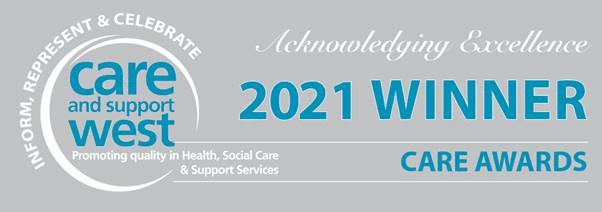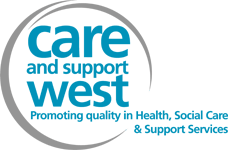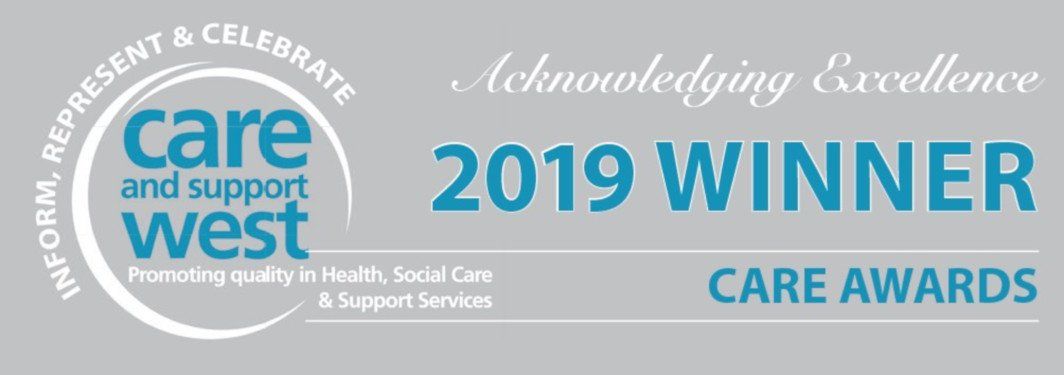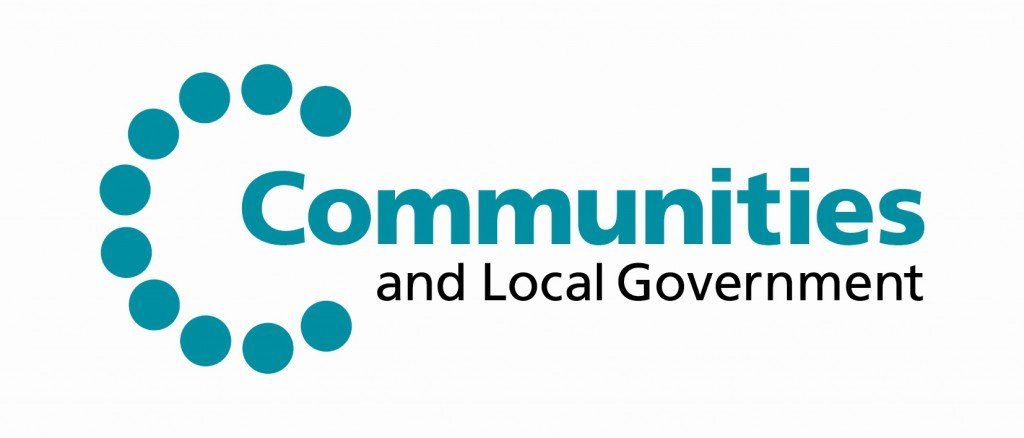Health+Care Conference 2019
- By Sophie Chester
- •
- 28 Jun, 2019
Health+Care Conference - Day 2 Summary

We're still buzzing from the talks at the second and final day of the Health+Care Conference in London. Expecting a quieter day than the first, our team thought we might get away early, but stayed right until the exhibitors started packing away due to some fantastic panel discussions...
Starting with my summary
I’d initially planned on whizzing around the theatres like yesterday.
However, with Matt Hancock’s Special Advisor
talking about his work, Cambridge and Peterborough STP
discussing parity of esteem, NHSX
pre-launch keynote address and CQC’s Ian Trenholm’s thoughts on the regulatory system, I
was firmly planted in the Healthcare’s Keynote Theatre all day.
Reflections from Richard Sloggett – Matt Hancock’s Special Advisor
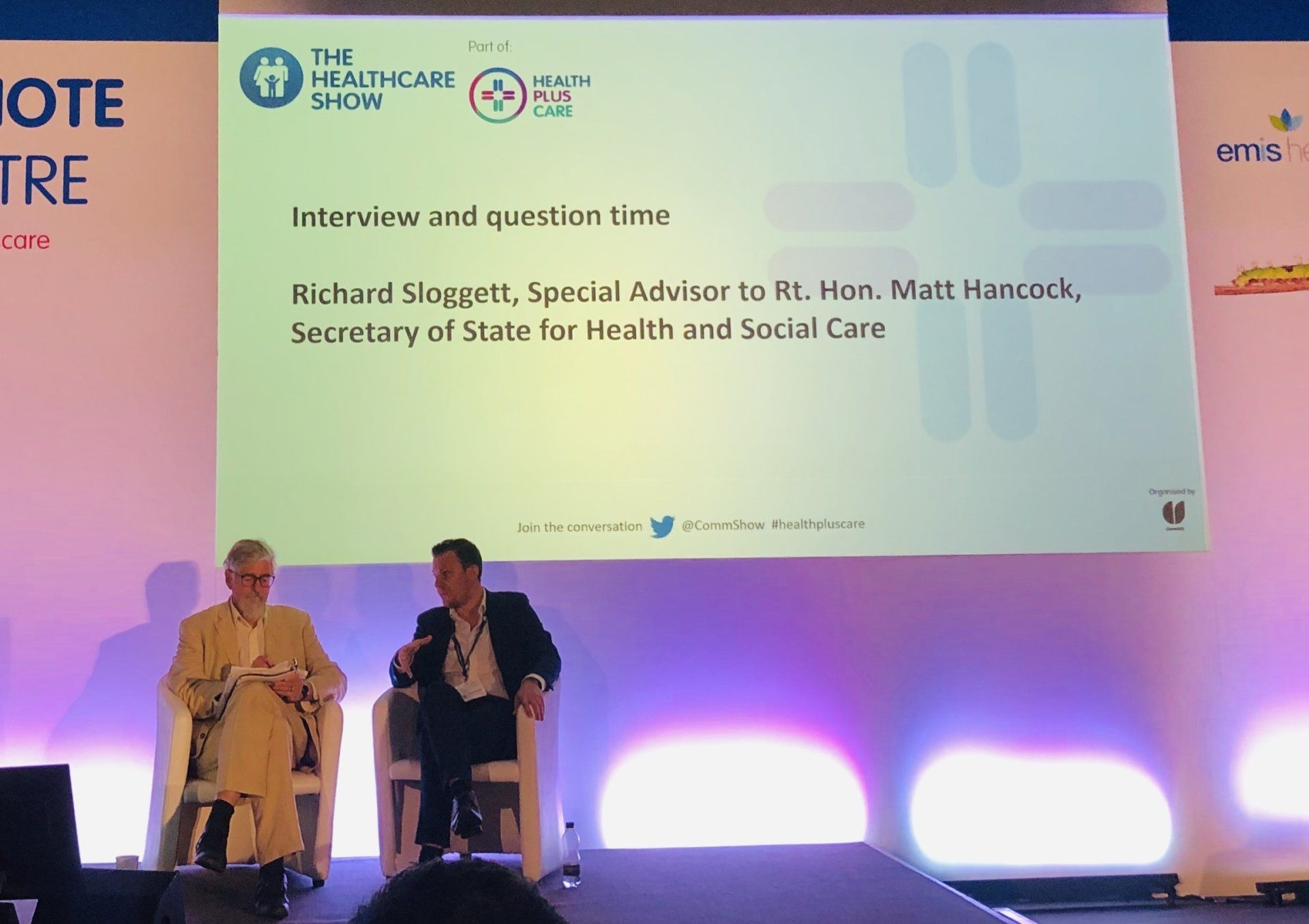
Richard explained that his job is unsurprisingly fast-paced, with his first experiences involving swatting up on acronyms to translate NHS policies it into public friendly messages. Possibly the most revealing (and random) part of Richard’s revelations was the ‘red box’ which, from what I could make out, was Matt Hancock’s in-tray. Anything that goes in it will be on his radar and must be addressed. Richard spent the majority of his day trying to clear the red box. Sensing the audience’s confusion, chairman Professor Paul Corrigan explained that this was part of how the constitution worked – if the Minister doesn’t see something and agree it, it isn’t happening. Makes sense.
Richard revealed that the 3 current priorities are:
- Workforce
- Technology
- Prevention
Presumably anything that has a faint chance of entering the red box has to at least cover one of these areas.
Something to look out for is the prevention green paper due out in July. Amongst other things this aims to cover what the government will provide and what they expect citizens to do in terms of preventing their own health deterioration. For Richard, the real point on prevention was population health management and that Integrated Care Services (ICSs) should be well place to deliver this.
He reminded us that next week on 1st July Primary Care Networks (PCNs) go live. The funding that is being allocated to PCNs should be filtered out to its partners – I think we all have a role in ensuring that this happens, especially since they will be rewarded financially if, for example, their activities reduce A&E admissions. Question is how will this be monitored?
Richard ended his talk with the observation that currently, as represented by the exhibitors at the conference, technology in care is 'explosive'.Parity of esteem in mental health
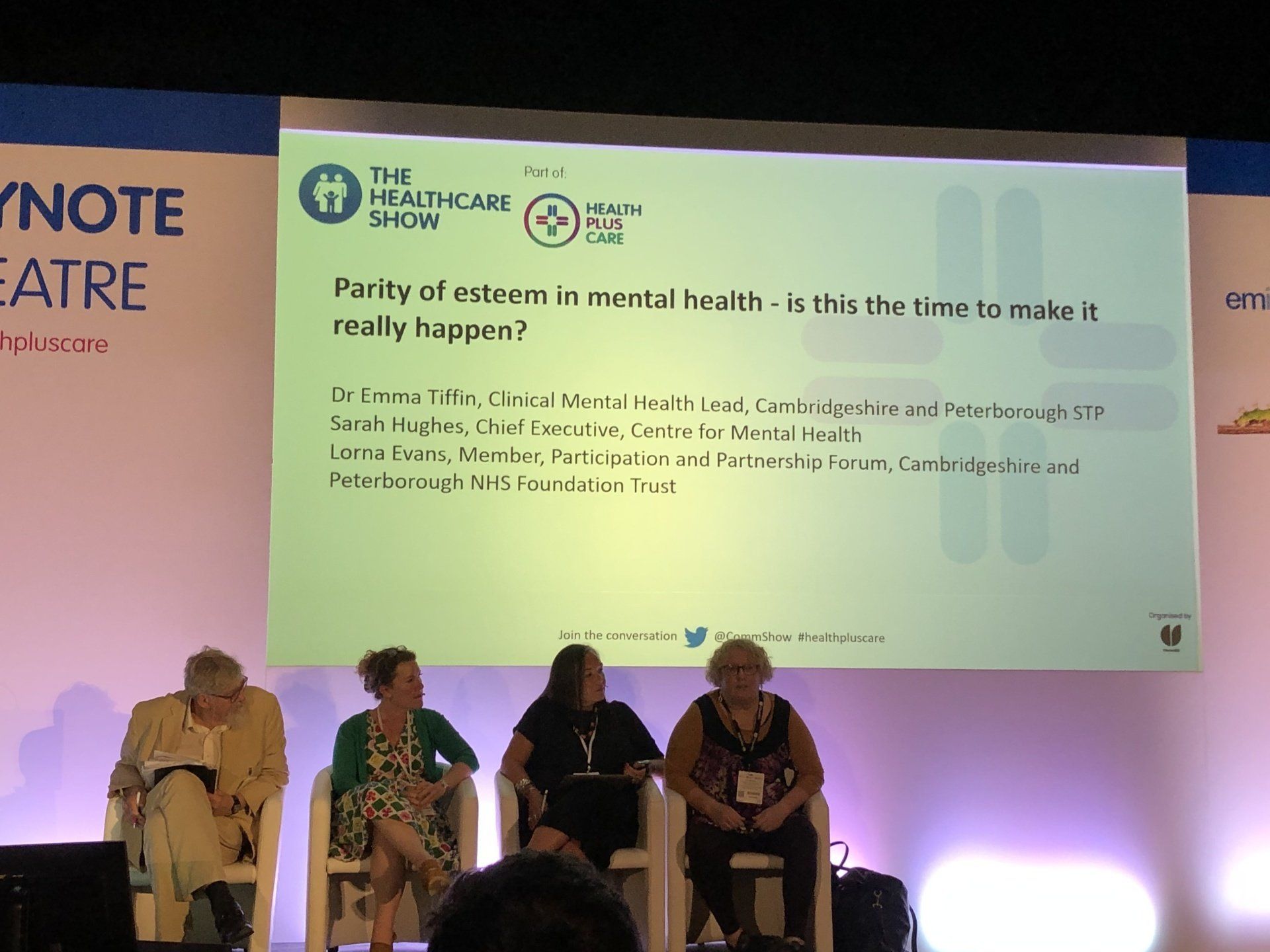
The question for this panel was 'Parity of esteem in mental health - is this the time to mke it really happen?'. The panel included Lorna Evans from Cambridgeshire and Peterborough NHS Foundation Trust, Emma Tiffin from Cambridgeshire and Peterborough STP and Sarah Hughs, Chief Executive of Centre for Mental Health. Lorna gave a heartwarming explanation of her own experiences of mental struggles following personal strategies – a strong user voice, maybe because user voices were not well represented at the conference, an improvement for next year maybe? Her insight into how Cambridgeshire promoted its Community Based Crisis Support helpline through 111 option 2, represented a key point of access and clear attempt to create practical parity.
Other important attempts at parity expressed by this panel include:
- Focusing on peer support
- Equally well
A great point prompted from an audience member's observation of the New Zealand’s model, came from Sarah. She felt that the political leadership in New Zealand was itself progressive and the UK was far behind that. Therefore, without a PM that is as progressive as theirs, we all need to become activists in our area and push for the change we want to see.
Do we need legislative change to make the NHS long term plan happen?
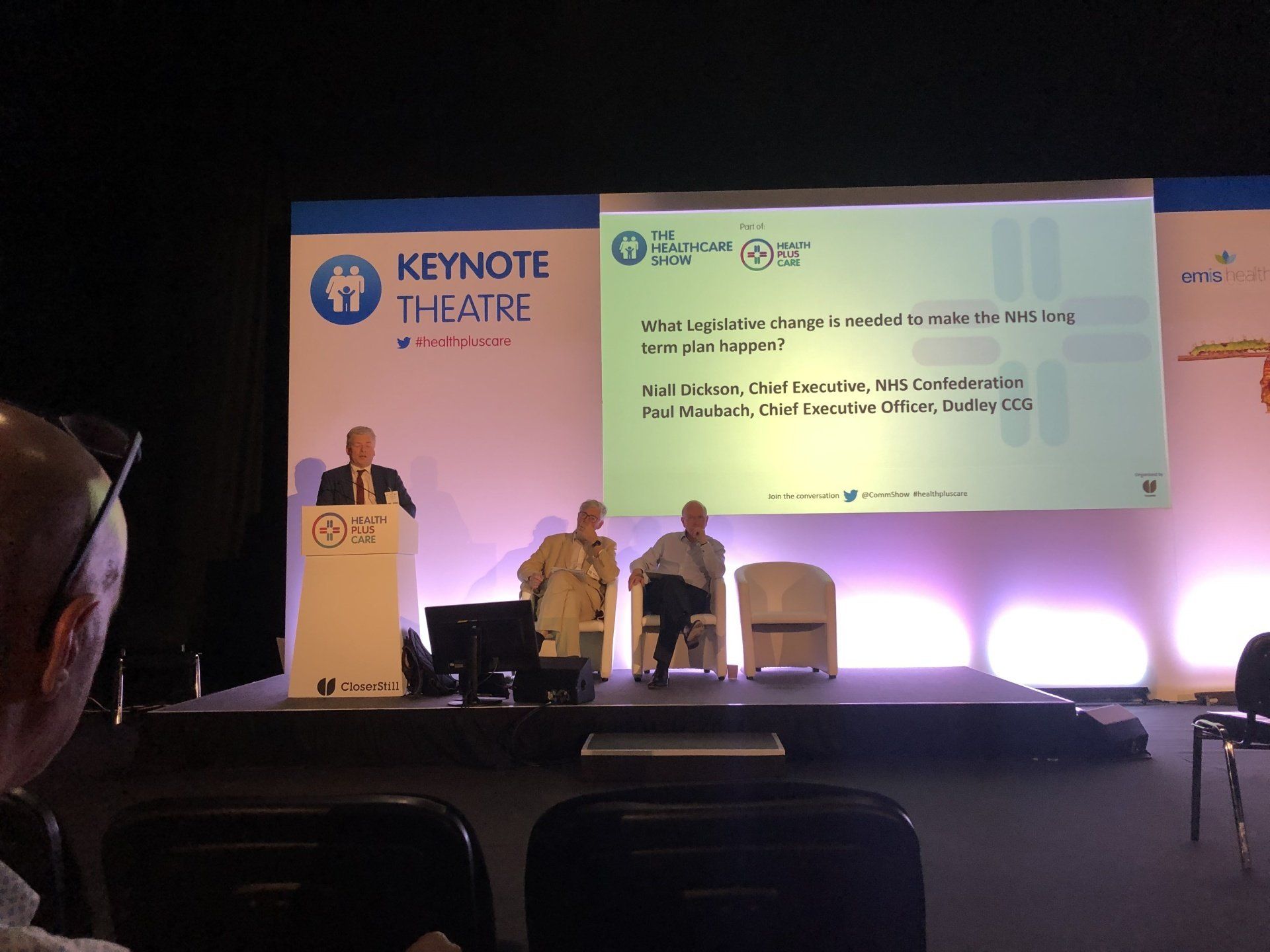
The short answer from Paul Maubach, CEO of Dudley CCO, was yes! His justification was that it would align incentives and practices and integrate providers. He argued that our legislation currently favours competition not collaboration and creates separation between the commissioner and provider. The change should instead privilege collaboration between the two. The Health and Social Care Act 2012 doesn’t, according the Paul, facilitate this. In fact I feel that this video by the Kings Fund from 2013 is still relevant in representing the complex quagmire of services, actors and initiatives that have been created:
Niall Dickson, from NHS Confederating listed his take on the challenge, including:
- A need for a ‘bet value test’ that is less subjective
- Greater flexibility locally, arguing that the NHS should produce on quality not price
- He recognised that there is a fear in the social community sphere of there being an ‘Acute Takeover’ and that they will be subsumed into larger NHS provision
Both Niall and Paul agreed that the 2012 Act should ideally be repealed. However, acknowledge the political unpopularity of this idea.
NHSX pre-lauch keynote by its CEO, Matthew Gould
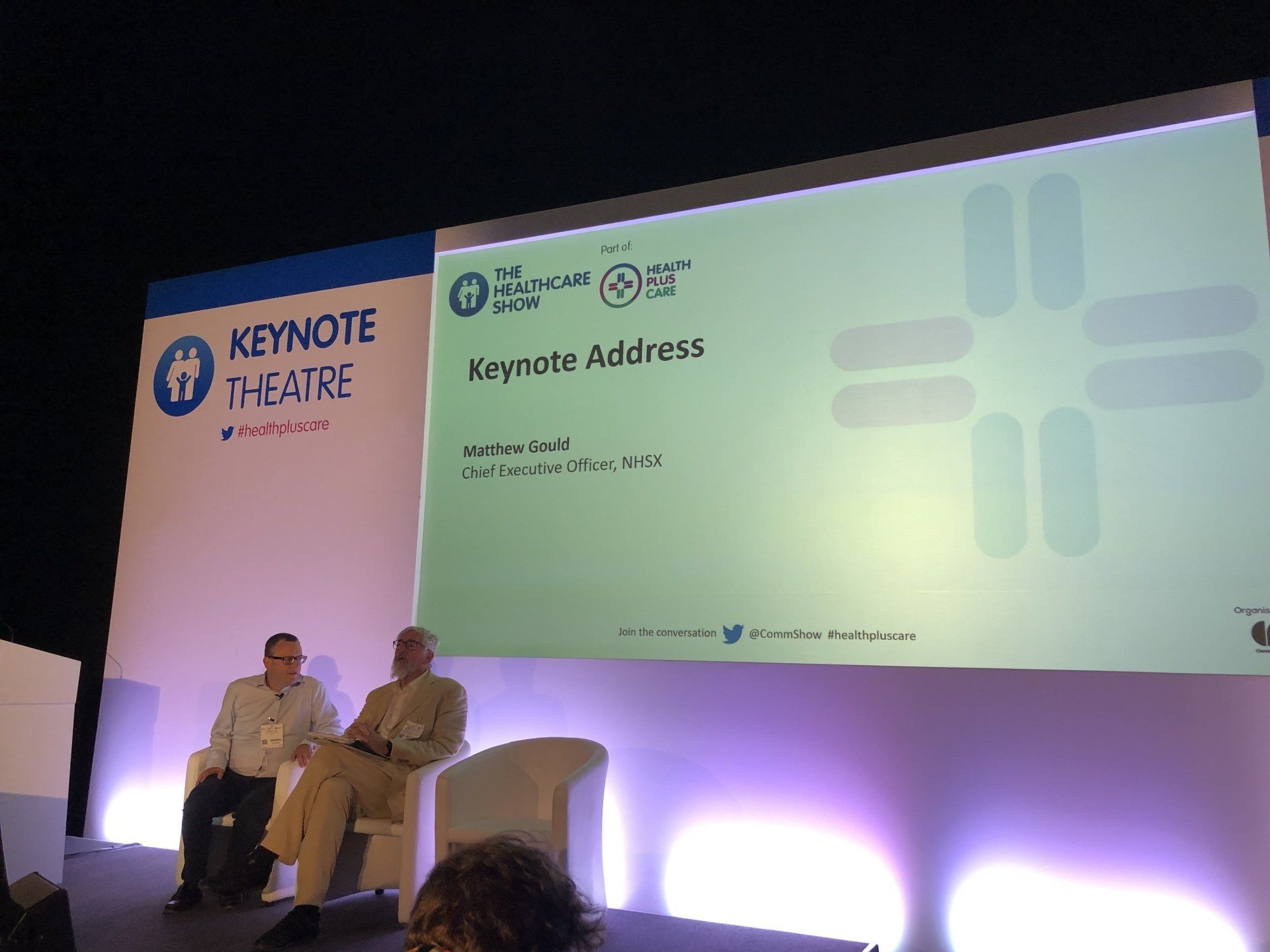
Large queues formed 15 minutes before this talk, representing a general buzz around NHSX. In fact after the talk I personally wasn’t too much clearer about what it would actually look like, but got the sense that neither did anyone else. The mission, however, was clear and very interesting. For a high-level intro, listen to this 5 min video from Matt Hancock
Matthew’s Gould's keynote address included these key messages:
NHSX is a new single decision-making team bringing everything tech related together to give patients and staff the technology they need.
What’s different? Not imposing top down decision on Trusts and CCG’s but instead letting professionals work together for local solutions. His aim was to ‘keep the centre thin’ and to create platforms from which others can develop on, but keep some things central such as screening and booking systems.
It will have 5 missions which include:
- Reduced burdens on staff so they can focus on patients
- Giving citizens the tools to access information and services directly
- Ensuring clinical information is safe and digitally accessed
- Improving patient safety across the NHS and
- Increasing productivity across NHS
A great question from the audience was, how would we know they are effective in say 2 years time? Matthew thought for a moment then suggested we judge NHSX against these 5 missions and at the very least on the fact of whether NHSX has made any impact at all. He argued that it really should have by then.
A few people also pointed out the Long Term Plan’s ambition to go paperfree by 2020. From the examples of poor systems in his talk, it was clear that this isn’t going to happen by then, but he was clear that it was still in their plans.
Ian Trenholm - CQC's Chief Executive on the future of inspection
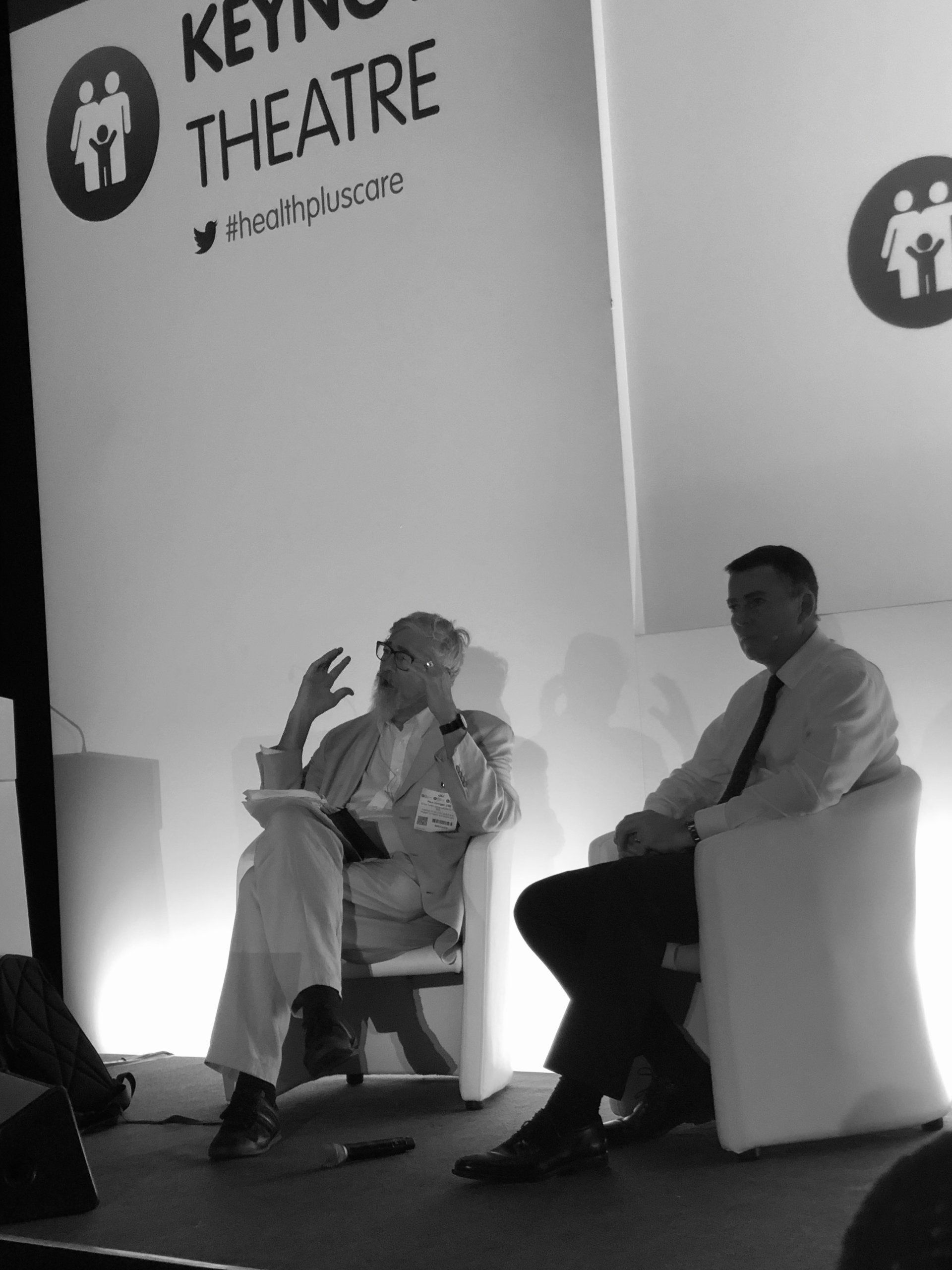
Another key leader in health and care, Ian Treholme, led the penultimate talk of the day. He remarked that CQC is still going on a journey but had a built up a reputation as a regulator with a methodology he felt worked. He showed frustration about the fact that CQC collects a lot of positive stories which are unrepresented by the media. Made me think, maybe this is where as a sector we can pick up on this and start sharing positive stories on platforms such as social media?
Ian mentioned that following the revelations at Wholton Hall by Panorama, the CQC went through and is still going through a process of reflection, asking: how was this able to happen? What could have been done differently to detect that the abuse might have occurred? They are going to investigate internally. I felt this critical reflective type practice was refreshingly honest. He explained that the future may include a digital solution to get poor practice evidence to them quicker from those using services and staff.
Ensuring safe technology by working with NHSX was a key passion.
In terms of personalised care, he was unequivocal that CQC will be inspecting services from the standpoint o effectiveness from a patient perspective. They will be expecting leadership to show how they are working collaboratively to enable this. This will be a key part of ‘Well-led’. I got the impression that without evidence of this collaborative working for better care, the top CQC ratings will start to become out of reach.
He mentioned that CQC are starting to review their regulatory process. They will be moving away from periodic reviews, whereby good or outstanding services are visited less often than others, and moving towards risk-based inspections. When I asked him to clarify this, it appears that the plans are very young and providers will be consulted, so keep an eye out for this consultation and please get involved.
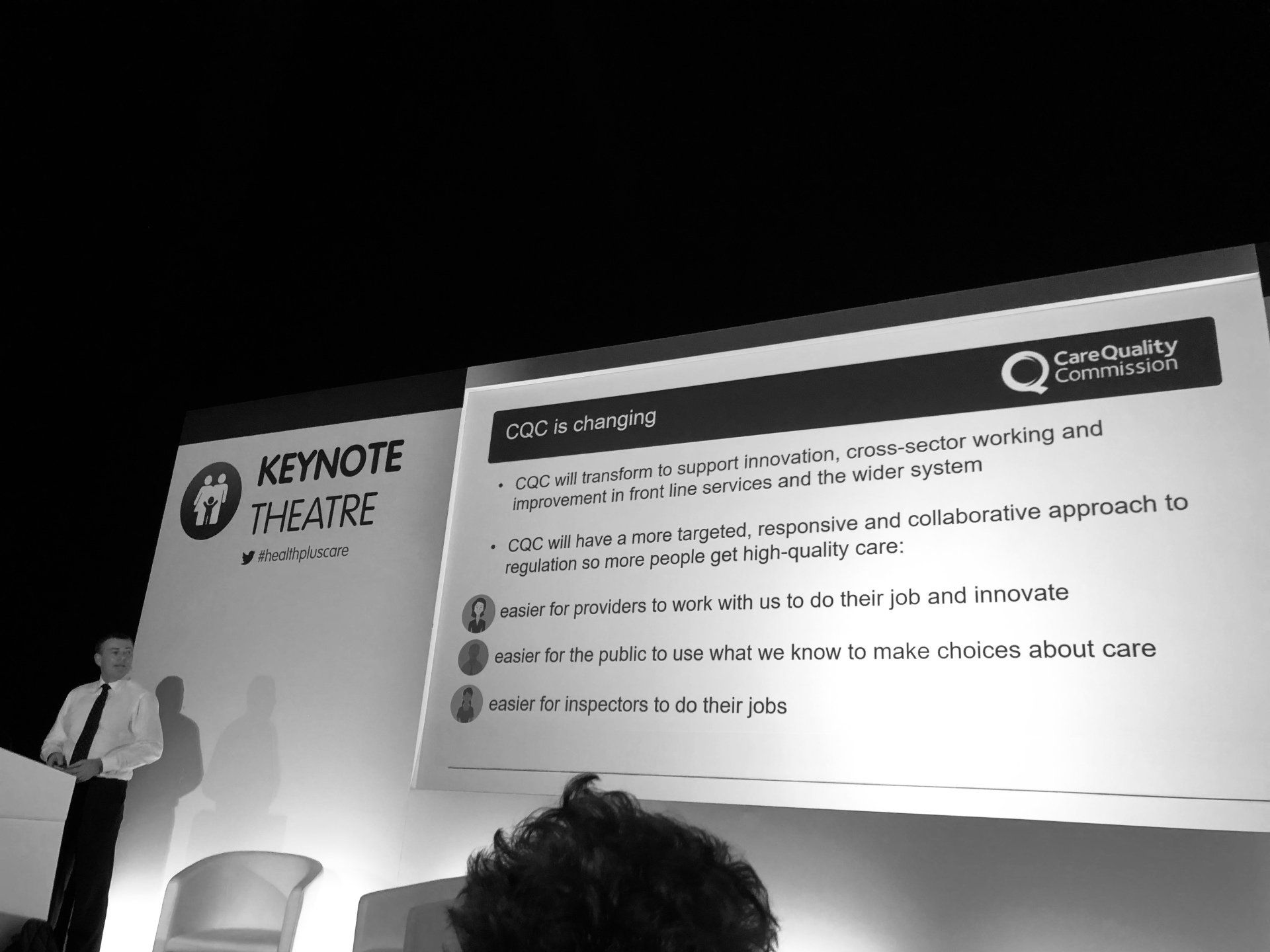
Questions from the audience for Ian
One audience member asked Ian about his views on families putting cameras in people’s bedrooms. Ian pointed out that pre-Wholton Hall he probably would have been more certain on an answer to this. Post-Wholton Hall, the jury was out and he understood the arguments for and against in terms of revealing poor practice which CQC might be unable to detect verses respecting a person's dignity and human rights.
My last question to him and I think to every really, was/is:
considering the push towards social prescribing, pushed through by PCNs, we will most likely see a lot of services traditionally provided by regulated providers, slowly and informally migrating to community groups and organisations. Should social prescribing be regulated in some way?
Understandably, seeing that PCNs are so new, there was no firm answer to this, but maybe a point to consider.
The last session from the Keynote Theatre
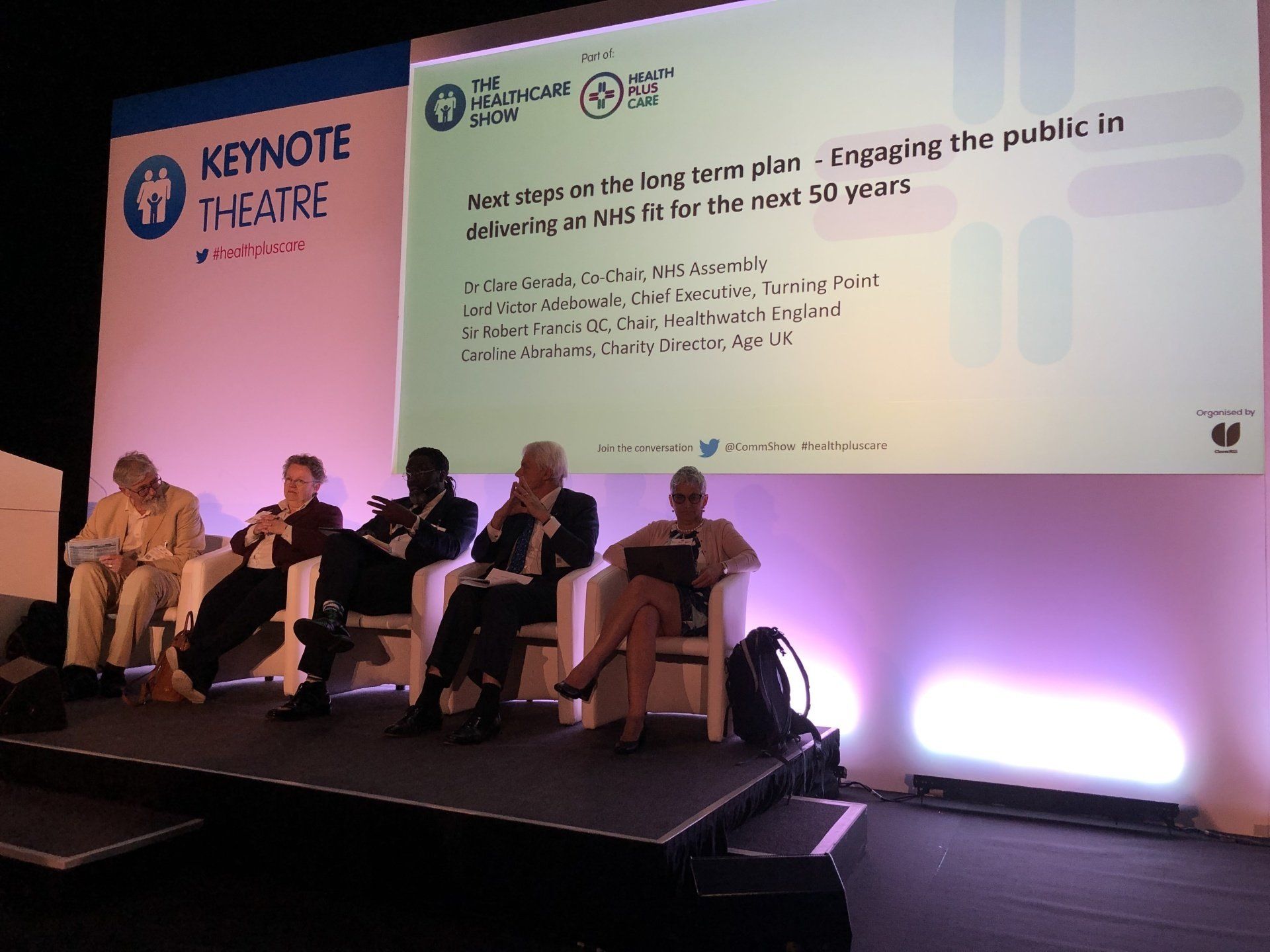
The last session was possibly the most lively one, with a full panel including Caroline Abrahams from Age UK, Lord Victor Adebowale from Turning Point, Clare Gerada frm NHS Assembly and Sir Robert Francis QC, Chair of Healthwatch Engand.
The panel was clear on the need to engage and consult with patients on strategic decision-making, but were not as clear on the role of enforcing coproduction (which I’m fan of and asked about). Other points included:
- Sir Francis promoting what I would term a dialectical approach with citizens to strategic decision-making
- Lord Victor Adebowale was concerned about ‘racist algorithms’ in technology, staff shortages and discrimination. Interestingly, he will be editing the BMJ’s next edition with a focus on discrimination – will be keeping and eye out on this.
- A great quote from Lord Adebowale was that ‘culture eats structure for breakfast’ and without a culture change, we can create all the STPs etc but will still operate top down.
Finally, from me ...

Finally, someone from the audience was from Think Local Act Personal (TLAP) and put in a plug to their Making It Real initiative, which they had made every effort to promote, but were still not seeing enough take up. This is a great shame. TLAP have effectively coproduced quality marks for health and social care. We (Manor Community), were early adopters and used Making It Real in a pilot and continue to do so.
Maybe people just do not understand what coproduction is!? The co-opting and misunderstanding of coproduction is a huge bugbear for me. I would urge people to check out and share TLAPs coproduction ladder and ask their leadership which step they operate on on the coproduction ladder?!
The TLAP question mirrors an important issue across the two days – the tools are there, it’s just making sure they get used and known by the right people and embedded into their culture.
Other nuggets from the rest of our team at the conference:
- Leicestershire County Council’s ‘housing support coordinator’ link role as part of a centralised program bringing different health and well-being support together to make more holistic preventative care plans to help move people out of hospital
- The Richmond Group of charities and their social prescribing collaboration across care, health and VSCE across Somerset.
- The King’s Fund’s recently published report on Wigan Council. Wigan Council ran a coproduced collaborative community development scheme that has been specifically linked to health benefits and mental health
- Clare from Care Forum Tech Transformation pointed out that we shouldn’t use tech for its own sake but keep in focus what difference does it makes for helping enhance relationships and that the person is at the centre of change.
That’s it from us! Hope it’s helpful, feel free to share if it is.
Sophie and the team @manorcommunity
Latest News from Manor Community
Manor Community Blog

Today we are going to be sharing our training focus this month, with our Training and Development Lead Jeannette.
As a care
worker, caring for individuals living with dementia can be both challenging and
rewarding. Understanding the condition and providing the right support are
crucial aspects of delivering quality care. In this blog, we will explore some
essential training tips that will help you provide the best care possible for
those with dementia.
1. Develop Comprehensive Understanding of the Different Dementia Types
Dementia encompasses various conditions, each with its unique challenges. Take the time to understand the most common types of dementia and their associated symptoms:
Alzheimer's Disease: Trouble recognizing people, communication difficulties, and impulsive behaviour.
Frontotemporal Dementia: Excessive emotions, shaky hands, and problems with balance.
Lewy Body Dementia: Inability to concentrate, muscle rigidity, and reduced facial expressions.
Vascular Dementia: Hallucinations or delusions, misplacing items, and poor judgment.
By understanding these conditions, you can better tailor your care approach to meet the individual's specific needs.
2. Top ways to tailor your care approach:
Simplify the Environment!
Creating a safe and easy-to-navigate environment is essential in dementia care. Here are three simple steps to simplify the home:
Remove Potential Hazards: Eliminate objects that can cause confusion or stress, particularly in hallways, to reduce the risk of falls and accidents.
Maintain a Clean and Comfortable Environment: A tidy and clutter-free home can help the individual feel more at ease, enabling them to remain sociable and inviting to friends.
Use Labels and Post-Its: Assist the individual in finding things and remembering appointments by strategically placing labels and post-it notes around the house.
A simplified environment can significantly reduce confusion and enhance the overall well-being of the person you are caring for.
3. Utilising communication skills
Communicating with individuals with dementia requires patience,
empathy, and understanding. Follow these communication tips to enhance your communication skills:
Speak Calmly and Reassuringly: A soothing tone can help them feel more at ease during conversations.
Use Clear Language: Keep your language simple and straightforward to avoid confusion.
Utilize Physical Prompts: Incorporate gestures and visual cues to aid communication.
Maintain Eye Contact: Eye contact fosters connection and makes them feel valued.
Remember, effective communication is key to establishing trust and rapport with the individual!
4. Encourage Meaningful Activities
Engaging in activities that align with the person's interests can improve their overall well-being and provide a sense of purpose. Here are some activities that provide visual stimulation:
Painting: Artistic activities can be incredibly therapeutic and enjoyable.
Gardening: Tending to plants can be a calming and rewarding experience.
Completing Jigsaw Puzzles: Puzzles can stimulate the mind and enhance cognitive abilities.
Playing Board Games: Simple board games can encourage social interaction and fun.
Activities play a vital role in the treatment and care of individuals with dementia, so ensure you incorporate them into the daily routine.
Thank you for reading and we look forward to next month!

Hello! Welcome to this new monthly update, where I, Gabriella, will be giving you the lowdown on any important updates happening in social care!
Government updates:
It was only last week that the NHS workforce plan was announced. This plan is the governments first ever long-term workforce plan, set to improve recruitment and retention over the next 15 years in the NHS. However, the government has not committed to developing a workforce plan for social care. This has been heavily criticized as a missed opportunity, as both sectors share crucial staff groups, and face the same urgent need for long-term investment to improve staffing recruitment and retention, to be able to provide good quality care. Read more about this here!
A new bill has been announced ‘Social Housing (Regulation) Bill) to improve the quality of social housing, also known as the ‘Awaab’s Law’ after the tragic death of 2-year old Awaab Ishak. Read more here.
Consultation alert: The government are seeking your views on visiting in care and health settings to inform their decisions around making visiting rules mandatory. Read more and submit your response here.
Campaigns you should know about:
‘My Time to Care’ is a campaign that starts local carers in Somerset. Six new videos have been launched to empower carers and showcases the strength, resilience, courage, and selflessness of care workers. Watch the videos here.
A new campaign ‘The Social Care Superpower Campaign’ launched last week, run by the Cygnet Social Care division. The campaign aims to highlight the extraordinary people who work in care, showcasing the incredible skills and work they do. Learn more here.
Age UK are now running a campaign called ‘We can’t wait for care’, putting a call to action for help to end the long wait for care. Learn more about this important campaign here.

It’s the last week in June, so of course we’re back at the Excel in London for the Health+Care annual conference where professionals from local authorities, NHS, providers and government come together to present ideas, thought leadership and share local initiatives on improving the health and care sector.
Here is my assessment of the first day:
The main themes were technology, social prescribing and more technology. Both of which were being touted as enabling collaborative working and effective care, with the main challenge being changing embedded cultures and habits.
All Rights Reserved | Manor Community
Manor Community is a trading company of Improving Prospects Limited registered number 06851740


